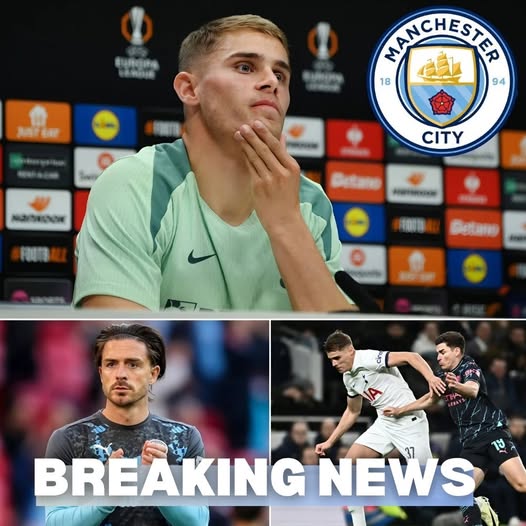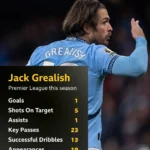Man City Set £40M Asking Price As 5 Clubs Line Up To Sign Player Who Guardiola Has Described As “Unbelievable”

The summer transfer window of 2025 has already begun to heat up, with one of the most intriguing storylines emerging from the Etihad Stadium. Manchester City, the reigning Premier League champions, have reportedly set a £40 million asking price for Jack Grealish, the England international winger who once commanded a British record transfer fee. This development has sent shockwaves through the football world, with no fewer than five clubs reportedly monitoring the situation closely.
The news comes as a significant departure from the optimism that surrounded Grealish’s arrival at Manchester City nearly four years ago. When the club paid Aston Villa £100 million for his services in 2021, breaking the British transfer record, expectations were sky-high. Grealish was seen as the missing piece in Pep Guardiola’s tactical puzzle, a player whose creativity and flair would unlock even the most stubborn defenses. However, the reality has proven far more complex than anyone anticipated.
The Decline of a Star
Jack Grealish’s journey at Manchester City has been one of unfulfilled potential and growing frustration. The 29-year-old winger, who once terrorized Premier League defenses with his pace, skill, and ability to draw fouls, has found himself increasingly marginalized in Guardiola’s system. The statistics tell a stark story of a player who has struggled to establish himself as a regular starter at one of Europe’s elite clubs.
During the most recent campaign, Grealish managed just seven Premier League starts for the Cityzens, a figure that starkly illustrates his diminished role within the squad. Perhaps even more telling was his status as an unused substitute on twelve separate occasions, watching from the sidelines as his teammates secured another Premier League title. For a player of Grealish’s caliber and reputation, such limited involvement represents a dramatic fall from grace.
The England international’s reduced playing time has not gone unnoticed by the national team setup either. His lack of regular club football has inevitably impacted his international prospects, with England manager Gareth Southgate consistently emphasizing the importance of players featuring regularly at club level. This creates a vicious cycle where Grealish’s diminished club role affects his international standing, which in turn may impact his confidence and performance when opportunities do arise.
Guardiola’s Tactical Evolution
To understand Grealish’s predicament, one must examine the tactical evolution that has occurred at Manchester City under Pep Guardiola. The Spanish manager has never been one to rest on his laurels, constantly tweaking and refining his approach to stay ahead of the competition. This relentless pursuit of perfection has led to a more structured, possession-based approach that prioritizes tactical discipline over individual flair.
Grealish’s natural game, which thrived on spontaneity and moments of individual brilliance, has struggled to find its place within this increasingly rigid framework. The winger’s tendency to drift inside, hold onto the ball, and attempt to create magic through individual skill has often conflicted with Guardiola’s emphasis on quick passing combinations and positional play. This tactical mismatch has become increasingly apparent as City have evolved their playing style.
The emergence of other attacking options has further complicated Grealish’s situation. Players like Jeremy Doku, who joined the club more recently, have shown greater adaptability to Guardiola’s system while offering similar pace and directness. The continued excellence of established stars like Riyad Mahrez (before his departure) and the development of younger talents have created intense competition for places in the starting eleven.
The Manager’s Honest Assessment
Perhaps the most revealing aspect of this entire saga has been Pep Guardiola’s remarkably candid assessment of Grealish’s situation. In what can only be described as a public acknowledgment of the player’s uncertain future, the City manager made comments that all but confirmed the winger’s departure from the club.
“Of course, Jack has to play. He’s an unbelievable player that has to play football every three days. It didn’t happen this season and last season either. He needs to do it – with us or another place,” Guardiola stated, his words carrying the weight of both praise and finality. The description of Grealish as “unbelievable” speaks to the manager’s genuine appreciation for the player’s talents, while the phrase “with us or another place” suggests a pragmatic acceptance that a change of scenery may be necessary.
The manager’s subsequent comments further reinforced this sentiment: “It’s a question for Jack, his agent, and the club. If he stays, it will be fine, and he fought like he fought from day one to make a contribution.” While diplomatically worded, these statements essentially place the ball in Grealish’s court, suggesting that the club would not stand in his way should he seek regular football elsewhere.
This public acknowledgment from Guardiola represents a significant shift in the narrative surrounding Grealish’s future. Rather than the usual platitudes about squad rotation and patience, the manager has been refreshingly honest about the situation, perhaps recognizing that clarity serves everyone’s interests better than false hope.
The Financial Reality
The reported £40 million asking price represents a significant financial loss for Manchester City, highlighting the harsh realities of modern football economics. Having paid £100 million for Grealish’s services in 2021, the club now faces the prospect of a £60 million write-down on their investment. This substantial loss underscores the risks associated with big-money transfers and the unpredictable nature of player adaptation to new systems.
However, the pricing strategy appears to be carefully calculated. At £40 million, Grealish remains expensive enough to ensure that only serious suitors will come forward, while being affordable enough to attract genuine interest from top-tier clubs. This price point sits in the sweet spot where Premier League clubs with ambition can justify the expenditure, while also being accessible to wealthy European clubs looking to add proven Premier League experience to their squads.
The financial implications extend beyond the transfer fee itself. Grealish’s reported £300,000 per week wages represent a significant commitment for any potential suitor. This salary level immediately rules out many clubs and creates an additional hurdle for those genuinely interested in securing his services. The wage structure becomes particularly challenging for clubs outside the traditional “big six” in England, who may struggle to accommodate such a significant salary within their existing wage bills.
The Suitors Circle
The interest from five different clubs speaks to Grealish’s enduring appeal despite his struggles at Manchester City. Each potential suitor offers a different proposition, and the variety of interested parties suggests that multiple pathways exist for the player’s next career move.
Aston Villa represents the most emotionally resonant option for Grealish. A return to his boyhood club, where he developed into a star and captained the team, would provide both familiarity and the guarantee of a central role. Villa’s recent stability under manager Unai Emery and their European ambitions make them an attractive proposition. The club’s supporters would undoubtedly welcome back their former captain with open arms, and the emotional connection could prove decisive in any decision-making process.
West Ham United offers a different but equally compelling proposition. The London club has established itself as a consistent Premier League presence with European ambitions. Their style of play, which emphasizes creativity and attacking flair, could suit Grealish’s natural game perfectly. The prospect of being a key player in a team that regularly competes in European competition, without the intense pressure of title expectations, might appeal to a player seeking to rebuild his confidence and enjoy his football again.
Everton presents perhaps the most intriguing option from a sporting perspective. The Merseyside club has faced significant challenges in recent years but possesses a rich history and passionate fanbase. For Grealish, Everton could represent an opportunity to become the focal point of a team’s revival, taking on the responsibility of helping restore the club to its former glories. The challenge of such a project might appeal to a player looking to prove his worth and capability as a difference-maker.
Newcastle United brings the allure of a project backed by significant financial resources and growing ambitions. The club’s recent rise under Saudi ownership has created an attractive proposition for top players seeking to be part of something special. Newcastle’s current trajectory, combined with their financial backing, could offer Grealish the opportunity to compete at the highest level while being a central figure in the club’s continued ascent.
Napoli represents the most adventurous option, offering Grealish the chance to experience a different football culture and prove his adaptability on the international stage. The Italian champions have a rich history and passionate fanbase, and their recent success in Serie A demonstrates their competitive credentials. For a player looking to revitalize his career and experience new challenges, the appeal of Italian football and the opportunity to compete in the Champions League could prove irresistible.
The Wage Conundrum
The financial reality of Grealish’s situation extends far beyond the transfer fee. His current salary of £300,000 per week represents a significant obstacle for many potential suitors, creating a complex negotiation environment that could determine the ultimate outcome of any transfer discussions.
Several of the interested clubs may struggle to meet these wage demands without significant restructuring of their salary caps. This financial constraint could lead to creative solutions, including loan arrangements with Manchester City potentially subsidizing part of the player’s wages. Such arrangements have become increasingly common in modern football, allowing moves that might otherwise be financially impossible.
The wage issue also raises questions about Grealish’s own priorities and flexibility. Any significant move may require the player to accept a reduction in his current earnings, testing his commitment to regular playing time versus financial security. The player’s age, at 29, adds another dimension to this consideration, as this may represent his final opportunity to secure a major move while still in his prime years.
Club World Cup Exclusion
The reported likelihood that Grealish will not be selected for Manchester City’s Club World Cup squad represents perhaps the clearest indication of his status within the club hierarchy. The Club World Cup, as FIFA’s premier club competition, represents the pinnacle of club football achievement. For a player of Grealish’s profile to be excluded from such a prestigious tournament sends an unmistakable message about his standing within the squad.
This exclusion serves multiple purposes from the club’s perspective. It provides a clear signal to potential suitors about the player’s availability while also demonstrating to Grealish himself that his future lies elsewhere. The timing of this decision, coming during the crucial summer transfer window, suggests strategic thinking by the club’s hierarchy to facilitate a smooth transition.
From Grealish’s perspective, this exclusion must serve as a wake-up call about his current situation. The prospect of missing out on what could be a career-defining tournament may provide the motivation needed to actively pursue a move that would guarantee regular playing time and the opportunity to compete at the highest level.
The Broader Transfer Market Context
Grealish’s situation must be understood within the broader context of Manchester City’s transfer strategy and the evolving Premier League landscape. The club’s need to raise funds through player sales reflects the ongoing financial pressures faced by even the wealthiest clubs in modern football. Financial Fair Play regulations, while sometimes controversial, continue to influence transfer decision-making at the highest levels.
The £40 million asking price also reflects the current market conditions for established Premier League players. In an era where young talents command fees exceeding £100 million, the pricing for experienced players like Grealish requires careful calibration. The club must balance the need to recoup investment with the practical reality of what the market will bear.
This transfer saga also highlights the increasing importance of tactical fit in modern football. Raw talent alone is no longer sufficient; players must demonstrate adaptability and alignment with specific playing philosophies. Grealish’s experience serves as a cautionary tale about the importance of thorough assessment beyond pure ability when making significant transfer investments.
International Implications
The resolution of Grealish’s club situation carries significant implications for his international career with England. The Three Lions have an abundance of attacking talent, creating intense competition for places in major tournaments. Regular club football becomes essential for maintaining international relevance, particularly for players approaching their thirties.
England manager Gareth Southgate has consistently emphasized the importance of players featuring regularly at club level, making Grealish’s current situation increasingly precarious from an international perspective. The upcoming Nations League campaign and future major tournaments represent opportunities that could be jeopardized by continued lack of club playing time.
The player’s international experience and proven ability at major tournaments provide additional value to potential suitors. Clubs considering a move for Grealish can be confident in his ability to perform on the biggest stages, having demonstrated his quality in European Championships and World Cup competitions.
The Psychology of a Fresh Start
For Grealish personally, this transfer saga represents more than just a career move; it’s an opportunity for psychological renewal and professional reinvention. The pressure and expectations at Manchester City, combined with the tactical constraints he has faced, may have impacted his confidence and natural playing style.
A move to a club where he would be the focal point of attacking play could provide the platform needed to rediscover his best form. The psychological boost of being wanted and valued as a key player cannot be underestimated in professional sports, where confidence often determines the difference between success and failure.
The opportunity to work with different coaching staff and tactical approaches might also benefit Grealish’s development. At 29, he remains in his prime years, with potentially several more seasons of top-level football ahead of him. The right environment could unlock the player who once dominated Premier League defenses with his skill and creativity.
Conclusion: A Defining Summer
As the summer transfer window progresses, Jack Grealish’s situation stands as one of the most intriguing storylines in football. The convergence of multiple factors – tactical mismatch, financial considerations, international implications, and personal ambition – creates a perfect storm that makes a transfer seem increasingly inevitable.
The £40 million asking price represents Manchester City’s pragmatic approach to a situation that benefits no one in its current form. For Grealish, the opportunity to revitalize his career and reclaim his status as one of England’s most exciting attacking players provides compelling motivation for change.
The five clubs reportedly interested in his services each offer different but attractive propositions, from emotional homecoming to ambitious new projects. The ultimate decision will likely depend on a combination of factors including financial terms, sporting ambitions, and personal preferences.
Whatever the outcome, this transfer saga serves as a reminder of the complex dynamics that shape modern football. Talent alone is not enough; tactical fit, financial sustainability, and personal circumstances all play crucial roles in determining success. For Jack Grealish, the summer of 2025 may well prove to be the defining moment that shapes the remainder of his career.
The football world watches with interest as this story unfolds, knowing that the resolution will have implications far beyond the immediate parties involved. In an era where player movements can reshape competitive balance and influence tactical trends, Grealish’s next destination could prove to be one of the summer’s most significant developments.
As Manchester City prepare for another season of domestic and international competition, and as interested clubs weigh their options, one thing remains certain: Jack Grealish’s future will be resolved one way or another before the transfer window closes. The only question is whether he will be wearing the sky blue of Manchester City or the colors of one of his many potential suitors when the new season begins.















